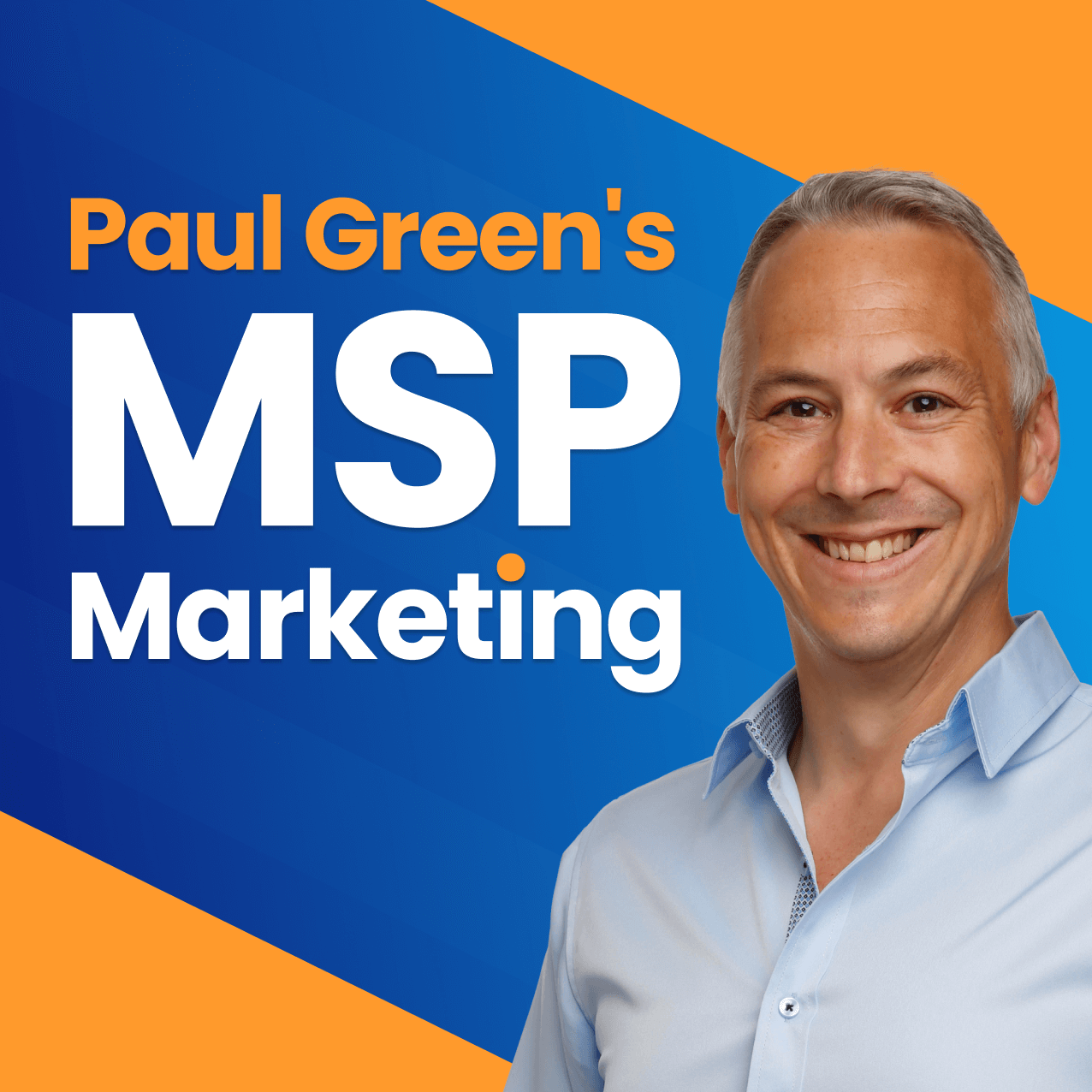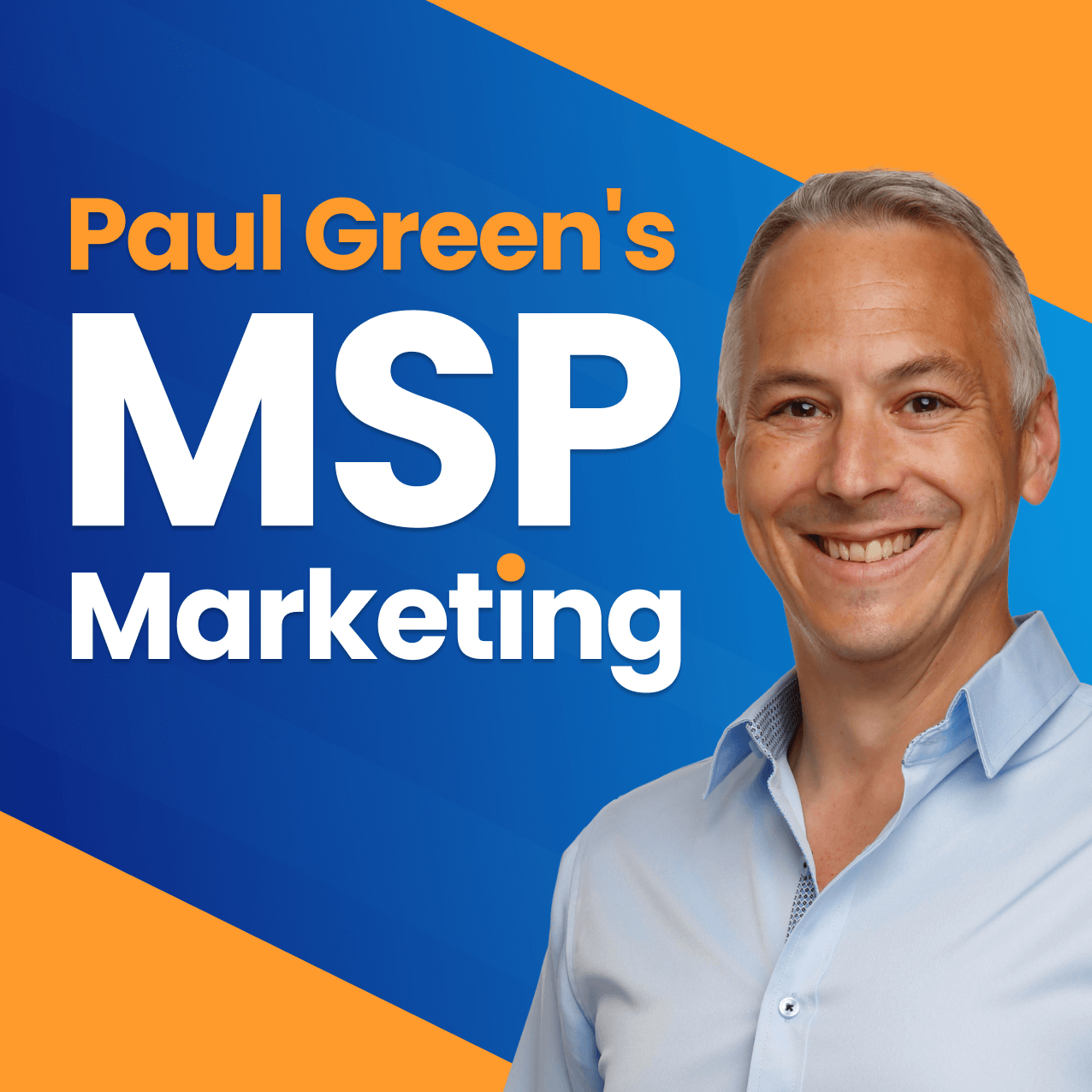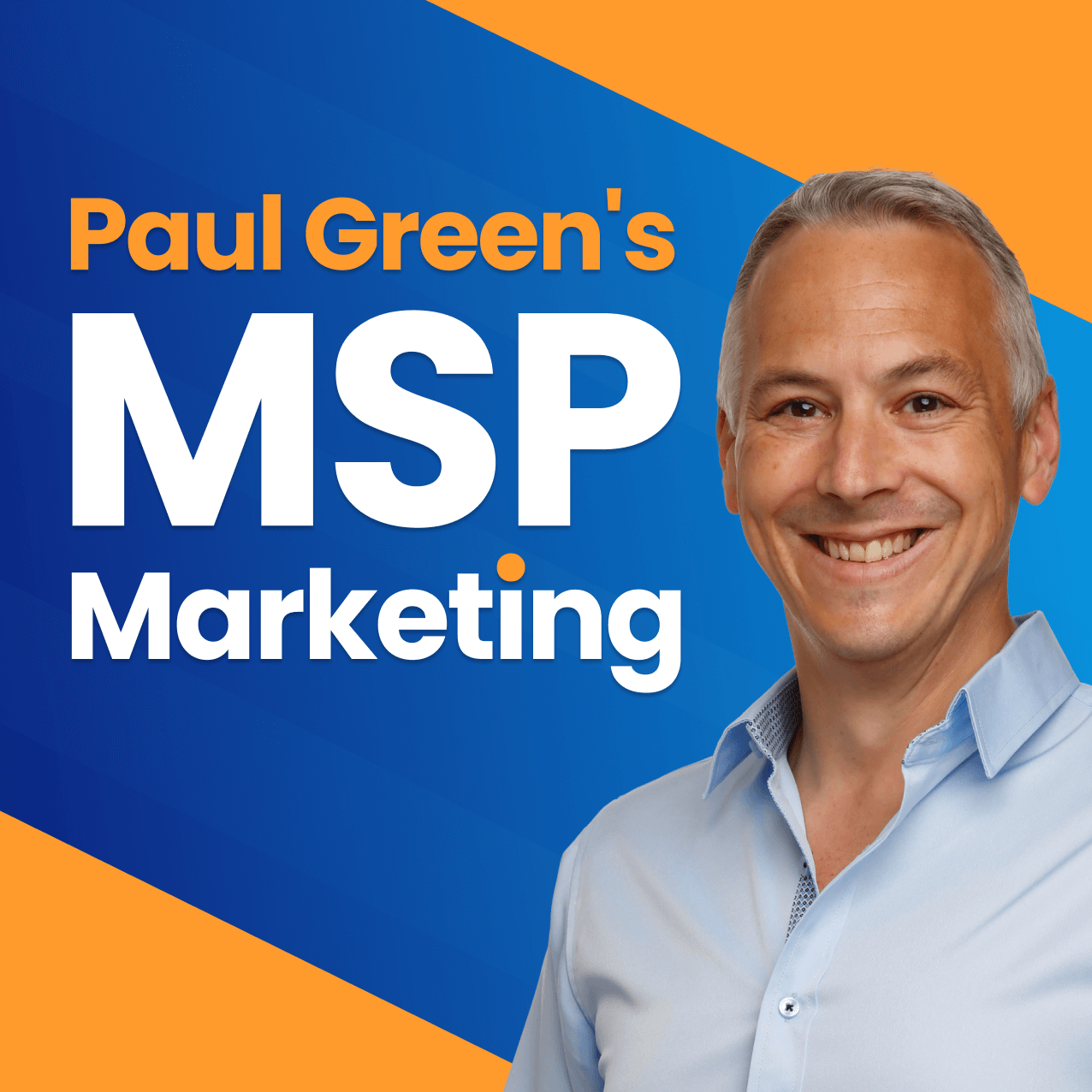SPECIAL: Should MSPs hire a chief growth officer?
Description
The podcast powered by the MSP Marketing Edge
Welcome to this SPECIAL edition of the show, Episode 268, of the MSP Marketing Podcast with me, Paul Green.
This week I’ve got another special episode for you. If your MSP isn’t growing, and you’re too busy running it to focus on growing it, this could be the answer for 2025.
Should MSPs hire a chief growth officer?
Featured guest: Jake Gregorich oversees revenue generation for Lyra Technology Group. He joined the team in January 2023 to help grow sales talent, increase collaboration among Lyra companies, and drive top-line revenue growth.
Prior to Lyra, Jake worked with MSPs including Impact Networking, Ntiva, and Equilibrium IT. He also served as an independent consultant to private equity backed MSPs and private equity companies looking to enter the MSP market on sales & marketing, diligence, acquisitions, and integration.
Outside of work, he enjoys time and good laughs with his wife Joanna, baby girl Sofia, toddler Charlie, golden retriever Bella, and large extended family. When he is not spending time with family and friends, Jake can be found outdoors hiking, biking, swimming, and playing team sports.
This is an MSP Marketing podcast special. Could this be any more perfect. A fresh idea, for a fresh new year. So, you want to make more money from your MSP and you’re looking for new ways to do it. Well, as we bring on a brand new year, it doesn’t get much fresher than this.
Welcome to a special episode dedicated to someone who’s found the solution to the problem of – how do you focus on growth if you are too busy with the day-to-day running of your MSP? Here’s a fresh perspective that’s definitely worth your time.
Hi, I’m Jake Gregorich, SVP of Growth at Lyra Technology Group.
And Jake, thank you so much for joining me for this special. It is of course your second appearance on the podcast. You were on, I think it was episode 205 back in late 2023, and ahead of having you back on the podcast again today I’ve just listened back to that, it was such a great interview and you were so very generous with the things that you shared. In our special today, we’re going to talk about what you guys are doing with this amazing MSP that you are building. And we’re also going to talk about the concepts of something called Chief Growth Officers. And not only in terms of how you’re doing that, because I think it’s really interesting how you are inspiring a large and growing number of people to grow their MSPs, but also we can look at it in terms of how the average MSP owner can take some of the concepts that you guys are proving are working right now and actually apply that within their own MSP.
So let’s start right at the beginning. Let’s assume that everyone who’s listening to this or watching this on YouTube has not heard you on the podcast before. Tell us exactly who you work for, what you guys are doing, what your mission is, and what you’ve achieved over the last few years.
Yeah, certainly Paul, great to be back, thanks for having me. Lyra Technology Group is a family of MSPs. We have now 77 companies across the US, Canada, the UK, Australia and New Zealand. Our business, compared to most highly acquisitive MSPs, is a bit different.
What we’re doing is we’re buying these companies (MSPs) but we’re retaining their people, their legacy, their brand.
And the Warren Buffett saying, first, don’t harm the investment in the business – and then we’re thinking about how we can help grow those companies. So our businesses are decentralised. Lyra is a shared service to those 77 businesses. And what Lyra does to help is we arm them with knowledge, with talent and scale, kind of giving them some of what makes a big company great, but without the bureaucracy of top-down decision making.
Yeah, I love that. I absolutely adore your business model. So from the customer’s point of view, do they even know that the MSP that they may have been in a relationship with for a number of years, do they even know that it’s changed hands? Do you tell people or do you hide it or is it a case of right, we’re part of something now, but actually it just gets better and we don’t change the name, we don’t change the people?
So most private equity backed MSPs will write into a deal that they’re going to lose 30% of the customers within two years of doing the acquisition because they’re kind of chopping up the business and it causes a lot of pain for the customer. We’re not hiding the fact that we’ve made this investment into the business, but to the end user and to the end customer, they’re not noticing a whole lot of change. We’re not coming in and forcing this MSP into our way of doing things. Some of our MSPs don’t really need to talk about us. They’re local, they’re working with small businesses. Some of them find it advantageous to tell the Lyra story on how they have this network of companies that they can now provide geographical coverage, maybe to their satellite office with boots on the ground or a depth and breadth of services within compliance or cyber security or automation that they didn’t have before, and they’re now able to offer that to their client. So because we’re decentralised, some of our businesses will tell their customers that this is a strategic advantage for them and why it benefits them and others will keep kind of doing business as usual.
I may have asked you this question when we spoke 18 months or so ago, but when you sort of started down this route of acquiring other businesses, was the original intention to rebrand them and bring them all together or was this always the goal from day one to operate in that way?
So seven years ago is when the business started with a single acquisition in Pittsburgh, Pennsylvania. And I’m not sure that everyone knew exactly what they were doing at the time, but the idea was really founded of, Hey, we’re going to make investments and we’re going to hold these companies forever and we’re going to make sure that we first don’t harm them. That was kind of the going model for four or five years. And then kind of recently, late 2022, Lyra started providing shared services to those businesses to give them the advantages of scale that a big company has. Before that time, we were mostly just operating, and now we’re really starting to see, as one of the biggest and fastest growing MSPs in the world, that we’re able to add quite a bit of firepower. If you imagine, we have this petri dish of MSPs, 77 of them, and we really get to see what works and what doesn’t.
So we’re able to create playbooks and peer groups and conferences where we bring our companies together and roll out those things or make them an option to be adopted at our other businesses. We can attract talent because of the Lyra story. And we have scale, so just imagine buying power, we’re the biggest customer to a lot of our vendors, you can adopt that. Geographical coverage, depth and breadth of services, those are some things that you can opt into that make you a little bit better and have a bigger advantage against a sole MSP or even a private equity backed MSP that does a centralisation and rollup strategy.
Yeah, I guess what you’re doing feels more like, well, we’re on the cusp of 2025 really… it’s tomorrow, so what you are doing feels more like a more authentic 2025 way of doing it. Whereas the let’s buy everything and change the name and centralise what we can and have a massive sock and a massive knock sitting in a city somewhere, serving the entire country, that feels like a more command and control kind of way of doing it.
It’s interesting, I don’t know if in the US you have the concept of garden centres, I think that might be a unique British thing, but I live in a village in the UK and a garden centre used to be a place where you’d go to buy stuff for your garden. But they’ve morphed over years and now they have restaurants and anything outdoors and anything for improving your home. And we have one down the road from us called Frosts, which has been family owned since 1940 something. They used to grow the actual plants where the garden centre is, that’s how it started as two people back in the forties selling plants. And that was actually acquired earlier this year and no one knew. And the only reason we know is there’s a tiny little logo that has appeared on their sign saying they’re part of the blue diamond group or something.
It’s exactly the same business model that you are talking about here, where they’ve been acquired and now they’ve got all this backend support, they’ve got incredible buying power, they’ve got access to new services and skills they wouldn’t have had before. But it’s still locally run, it’s still locally operated. And the local people who are running the business in the village, they can make the decisions, which is really cool. So I expect that business to just get even better. And I think actually locals, if they’ve seen the name change, to like a national chain, you almost expect quality to come down and prices to go up. So that’s why I say I love your business model.
I have to ask, what are the downsides? Obviously you are part of the management team growing the overall business. What are the downsides of that decentralised model?
So we’ve talked about a bunch of the upsides, right. But it’s the blessing and the curse. We get to align to customers and employees, like you said, and keep tha









